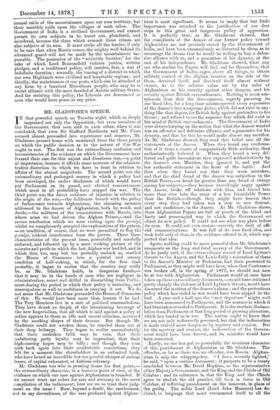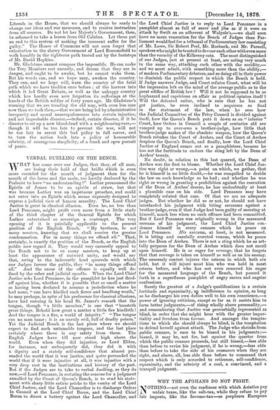MR. GLADSTONE'S SPEECH.
TN that powerful speech on Tuesday night, which so deeply
impressed not only the Opposition, but even members of the Government, that men said to each other, when it was concluded, that even Sir Stafford Northcote and Mr. Cross seemed almost persuaded into repentance and remorse, Mr. Gladstone pressed home with unwonted force the three points on which the public decision as to the nature of this War ought to rest. The first was the extraordinary confusion and inconsistencies of the evidence on which the Government have framed their case for this unjust and disastrous war,—a point of importance, because it affords some measure of the adminis- trative discretion to which we have to trust in relation to affairs of the utmost magnitude. The second point was the extraordinary and prolonged secrecy in which a policy had been enveloped, the earlier disclosure of which would have put Parliament on its guard, and elicited remonstrances which must in all probability have stopped the war. The third point was the direct evidence of injustice in relation to the origin of the war,—the deliberate breach with the policy of forbearance towards Afghanistan, the alarming menaces addressed to the Ameer of Afghanistan, both by words and deeds,—the mildness of the remonstrance with Russia, into whose arms we had driven the Afghan Prince,—and the severe retribution which we were visiting upon the protege', whilst we complacently accepted the explanations of the patron, —on condition, of course, that we were permitted to flog the protégé, without interference from the patron. These three characteristics of the present issue, powerfully and carefully enforced, and followed up by a most striking picture of the miseries and perils to which the last Afghan war had led, and in which this, too, may but too probably embark us, startled the House of Commons into a painful and uneasy condition of half-waking, in which, for the first time probably, it began to realise that the country may really be, as Mr. Gladstone holds, in dangerous hands,— that it may be in the hands of men who are negligent in administration, secret and skilful in dissembling from Parlia- ment during the period in which their policy is maturing, and unscrupulous as well as ambitious in carrying it out. We do not mean that Mr. Gladstone persuaded the House of Commons of this. He would have been more than human if he had. The Tory Members live in a sort of political somnambulism. They have drunk so deeply of the intoxicating beverage of the new Imperialism, that all which is said against a policy of
action appears to them as idle and unreal criticism, muttered by the mocking shapes of their dreams. But though Mr. Gladstone could not awaken them, he startled them out of their deep lethargy. They began to realise uncomfortably that their unshaken faith may be vain, that their unfaltering party loyalty may be imprudent, that their high-soaring hopes may be folly ; and though they soon sank back again into their comfortable convictions, they felt for a moment like shareholders in an unlimited bank, who have heard an incredible but too painful whisper of serious losses, of capital exhausted, of dubious solvency.
Mr. Gladstone was wise in pressing home his first point,— the extraordinary character, in a business point of view, of the evidence on which our case against Afghanistan is founded. If we cannot trust our rulers for care and accuracy in the mere zampilation of the indictment, how are we to trust their judg- ment on the issue ? Now, beyond a doubt, the carelessness, not to say slovenliness, of the case produced against Afghan-
Wan is most significant. It seems to imply that but little importance was attached to the justification of our first steps in this great and dangerous policy of aggression. It is perfectly true, as Mr. Gladstone showed, that the complaints of the Ameer of our former policy toward Afghanistan are not precisely stated by the Government of India, and have been unconsciously so distorted by them as to encourage the dream that he would be willing to buy a defen- sive alliance with us, and a guarantee of his dynasty, at the cost of his independence. Mr. Gladstone showed, what any one who studies the Papers will find out for themselves, that the Government of India, eager, above all things, to obtain military control of the Afghan frontier on the side of the Oxus, deceived itself, and deceived itself almost without excuse, as to the relative value set by the ruler of Afghanistan on his security against other dangers, and his security against British encroachments. Nothing is more con- spicuous than that the Government, eagerly pursuing its one fixed idea, for a long time misinterpreted every expression of the Ameer's into a supreme desire, which did not exist in any- thing like that degree, for British help against pretenders to his throne ; and refused to see the supreme fear which did exist in his mind of British encroachments. The Government of India were always harping on the notion that what the Ameer wanted was an offensive and defensive alliance, and a guarantee for his dynasty, and that for this he would make almost any sacrifice. As Mr. Gladstone showed, they read this belief into all the statements of the Ameer. When they heard any confirma- tion of it from a source of comparatively little authority, they enthusiastically believed it. When they heard a very dif- ferent and quite inconsistent view expressed authoritatively by the Ameer's own Minister, they ignored it, and put the less authentic statement in the front of the battle. And then when they found out that they were mistaken, and that the chief dread of the Ameer was subjection to the British Power,—a dread far greater than any dread of risings among his subjects,—they became exceedingly angry against the Ameer, broke off relations with him, and forced him more than ever into the arms of a less formidable Power than the British,—though they might have known that
every step they had taken was a step to sow distrust, and not confidence, in the Ameer. As Mr. Gladstone shows, these Afghanistan Papers are full of proofs of the blind and hasty and preoccupied way in which the Government set about its new policy. It could not see what was plain before its eyes. It could not even restate correctly the drift of offi- cial communications. It was full of its own fixed idea, and took hold only of that, in the evidence offered to it, which sup- ported that idea.
Again, nothing could be more powerful than Mr. Gladstone's comments on the long and fatal secrecy of the Government. As he justly said, if the extraordinary record of Lord Lytton's threats to the Ameer, and Sir Lewis Pelly's reiteration of them to the Ameer's Minister at Peshawur, had been presented to Parliament, as they might well have been, when that Conference was broken off, in the spring of 1877, we should not now be at war with Afghanistan. Parliament would at once have taken up these extraordinary documents,—would have criticised pretty sharply the violence of Lord Lytton's threats, would have discerned the motives of the Ameer's alarm ; and the pretentious policy which has ended in war would have been nipped in the bud. A year and a half ago, the "new departure" might well have been announced to Parliament, and the manner in which it had been taken revealed to Parliament. It is the resolute dissimu- lation from Parliament of that long period of growing alienation, which has landed us in war. The nation ought to know that we are not only indiscreetly governed, but that the indiscretion is made tenfold more dangerous by mystery and evasion. But for the mystery and evasion, the indiscretion of the Govern- ment would have been known, and its mistakes would have been corrected.
Lastly, no one has put so powerfully the vicarious character of this punishment of Afghanistan as Mr. Gladstone. The offender, so far as there was an offender, was Russia. Afghan- istan is only the whipping-boy. "I have recently lighted," he said, "upon a curious document ; it purports to be a treaty concluded between Mr. David Hopkins, as the representative of her Majesty's Government, and the King and the Chiefs of Old Calabar ; and its substance is, that the King and the Chiefs agree to abolish the old practice, till then in force in Old Calabar, of inflicting punishment on the innocent, in place of the guilty. The noble Lord (Lord John Manners) his de- clared, in language that must recommend itself to all the Liberals in the House, that we should always be ready to change our ideas and our measures, and to receive instruction from all sources. Do not let her Majesty's Government, then, be ashamed to take a lesson from Old Calabar. Let them put an end to this system of making the innocent suffer for the guilty." The House of Commons will not soon forget that exhortation to the showy Government of Lord Beaconsfield to walk humbly in the righteous path traced out by the footsteps of Mr. David Hopkins.
Mr. Gladstone cannot compass the impossible. He can make the Tory Members rest uneasily, and dream that they are in danger, and ought to be awake, but he cannot wake them. But his words can, and we hope may, awaken the country. They can, and we hope will, warn the country of the fatal path which we have trodden once before ; of the horrors into which it led Great Britain, as well as the unhappy country which has hardly even now forgotten its sufferings at the hands of the British soldier of forty years ago. Mr. Gladstone's warning that we are treading the old way, with even less care now than we took then,—that we are being led by administrative incapacity and moral unscrupulousness into certain injustice, and not improbable disaster,—indeed, certain disaster, if it be disaster to set up a new blood-feud with a neighbouring race,— though it will be too late to prevent the war, will not be too late to arrest this bad policy in full career, and to turn the nation back into a policy of honourable sobriety, of courageous simplicity, of a frank and open pursuit of peace.







































 Previous page
Previous page